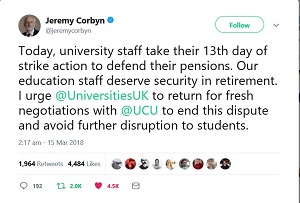This fourth week of industrial action, we are striking for five days. I outlined in my previous blogpost some of the issues in the pensions dispute. I outline some more here, and list other issues academics are concerned about, which I hope to write further blogposts about. I have wanted to write about some of these issues for a long time, but have only just managed to clear space on my teaching desktop. (As I am supposedly on part-time hours that in itself says something about my workload.)
During this strike, membership of our union (Universities and Colleges Union, or UCU) has doubled and visible presence on the picket line has grown every day of the strike.
A recent proposed offer by our employer (Universities UK, or UUK) was rejected in the most emphatic terms by every single branch of the UCU at universities taking part in the strike action. The terms of the offer led to emotional outbursts on Twitter and Facebook, with anger particularly strongly expressed at a suggestion that staff could reschedule missed lectures - without receiving back strike pay.
The attempt to redefine our pension fund was a blatant and inhumane attack on our rights as workers. It is the last of many straws. During the strike, much was written about the neoliberal approach to education in which degree-level studies have been comprehensively commodified. Academics on strike and mainstream media commented on:
- The poor pay, insecure contracts and long hours which degrade the lives of academic staff;
- A consequent degrading of teaching provision, and therefore of student learning.
Here at the Open University, our student learning has always been provided differently to the way learning is supported in traditional universities, and our students tend to be mature students from economically poorer backgrounds. Many of my students are mums of young families, and working as well as studying.
I wasn't very good at striking, I'm afraid! I tried hard to make sure my students weren't too badly affected by my being out on strike. I know how hard they have struggled to get to study. Often lacking in confidence, happening to start studying just when we go on strike is the sort of thing that my students can feel is directed at them personally by a force outside of society. "You have the cheek to think you can study and improve your life? Take that then!" My students are often themselves in insecure work with poor pay and no pension provision. They are studying to get out of this situation, so they are generally sympathetic to our cause. (I had many messages of support from my students, who were very patient when I couldn't fully support them as I would ideally want to.)
Like other academics, I am worried about more than my pension. I took strike action partly to highlight how riven with problems the whole Higher Education sector has become.
Many of the issues which staff at other universities fear may affect their ability to teach well are already confronting us at the Open University. At the same time as co-ordinating strike action in support of secure pension provision, our union branch is:
- Engaged in negotiations for permanent contracts for thousands of Associate Lecturers (that's me!), which have been ongoing for 10 years and which we still hope to conclude this summer;
- Tracking and preparing to protest at large scale cuts which the university says will require the loss of thousands of jobs among support staff;
- Tracking rapid and wholescale change in the way learning is supported through digital media - which has left many teaching staff exhausted, in need of a period of reflection and absorption, but instead we are facing more rapid wholescale change;
- Tracking and protesting at the introduction of MOOCs instead of blended learning, with a possible radical change in the tutor-student relationship - a relationship that is literally vital to many of our students.
Pensions and the Phantom Deficit
A pension is not a perk. It's 'deferred salary'. I have paid some of my own salary into a pension fund, and my employer agreed to pay some more so that I could collect this part of my salary when I retire.
A number of economists and statisticians have comprehensively demonstrated that there is no credible evidence of a deficit in the Universities Superannuation Scheme. Back in November 2017, Dennis Leach, Emeritus Professor of Economics at Warwick showed that the USS pension scheme is not in crisis and it is not in deficit. There is no justification for massive pension cuts or gambling on defined contributions: https://henrytapper.com/2017/11/25/is-the-uss-really-in-crisis/
So secure was the fund that in the 1990s, it was judged over-funded and employers took a 'contributions holiday' - paying less into the fund. Some argue that this sum alone is more than enough to cover the Phantom Deficit.

(Photo from Tweet: https://twitter.com/EdGarethPoole/status/971702270286057472)
The valuation of the fund as being in deficit seems to have been partly influenced by the UK government's Pensions Regulator. For this and many other reasons, it looks like the government ought to be taking part in the negotiations - lending support to those of us who may be very badly affected by the changes being proposed. We have had excellent support throughout from the Leader of the Opposition.
(Link to tweet: https://twitter.com/jeremycorbyn/status/974213079008514048)

Comments
New comment
Hiya Anita,It is good to read your post.
As a student I fully support the strike and believe it is time that V.C Peter Horrocks accepts that the proposed pension changes amounts to nothing more than wage theft.
Keep up the good fight.
In solidarity
Sharon
New comment
Hi Anita,
Do you know if students are going to get refunds/compensation for missed lessons?
I'm curious because a kid I know is at Uni in Brighton and has had numerous lectures cancelled because of the strike. She says that the students are anxious about asking for compensation because they think the professors will mark them down if they seem difficult or unsupportive. She said she paid about £10k for the year. Clearly this must include lessons so I wondered if there is a compensation scheme for students who are not receiving their tuition?
Many thanks,
Fiona
New comment
Thank you Sharon #solidarity
#solidarity
Fiona, I work at the Open University where the system is a little different. Having worked previously at traditional universities, I know that considerable effort is made to anonymise students' assignments so that it should never be known if someone was 'difficult' and that would not affect the mark - which is based on academic performance.
Secondly, asking for fees back is being done as part of the strike action - to put pressure on universities, so many academic staff are in favour of students doing this. Your friend should be able to get advice from her student union https://www.brightonsu.com/ or the National Union of Students https://www.nus.org.uk/